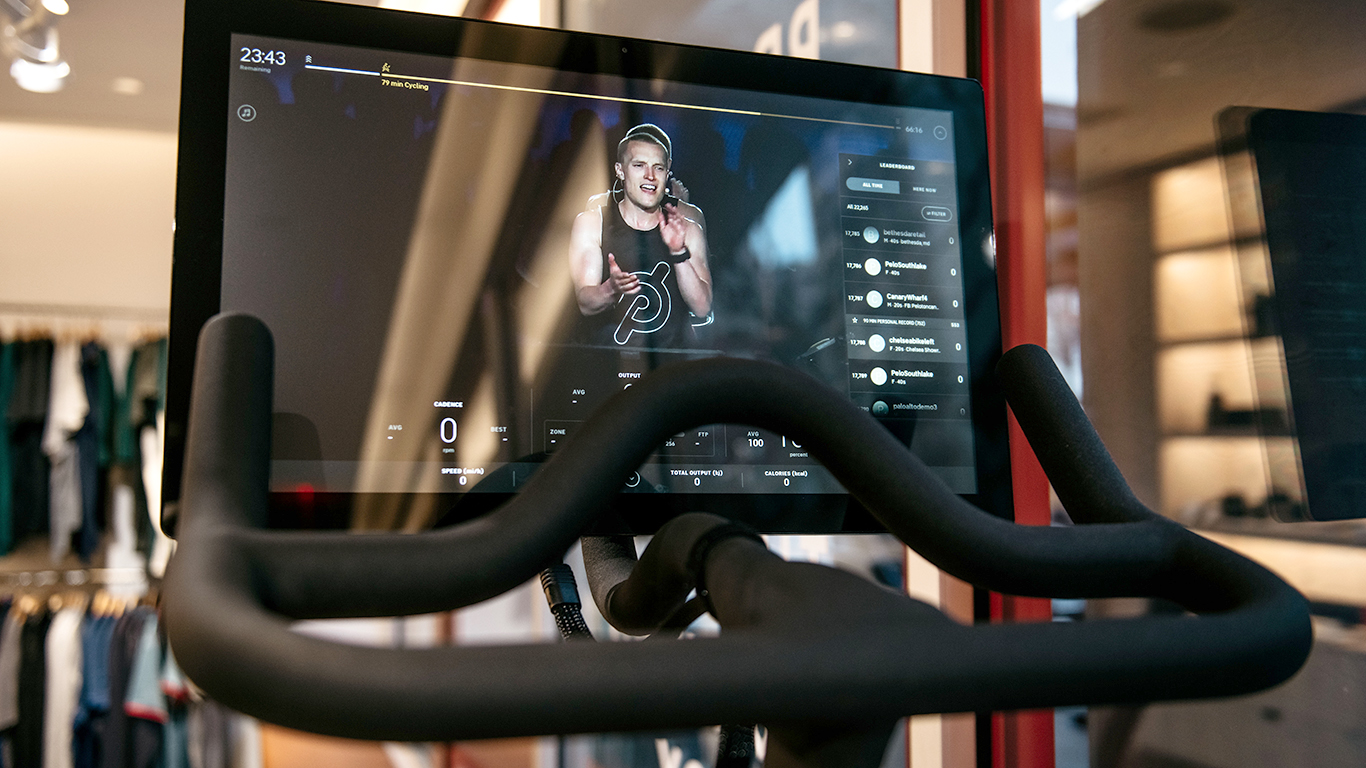
If there’s one thing investors like to see from a company, it’s a captive revenue stream. That stream is typically based on a customer subscription service, whether to movies, TV, music or something else.
One of those something elses is turning out to be virtual fitness programs, which was basically created by Peloton Interactive Inc. (NASDAQ: PTON), maker of exercise bicycles and treadmills that include an interactive touchscreen to stream live and on-demand fitness classes. The bikes are pricey at around $2,250, not including the $39 monthly subscription fee for the streaming services.
The COVID-19 pandemic and stay-at-home orders were a real boon to Peloton, which came public in late September of last year and saw its share price plunge to below $18 in mid-March before soaring to more than $73 earlier this month.
Lululemon Athletica Inc. (NASDAQ: LULU), which just paid $500 million to acquire Mirror, an in-home, interactive exercise video instructor, also could feel some competition from an Apple Inc. (NASDAQ: AAPL) fitness offering. The interactive Mirror carries a price tag of $1,500 and monthly subscription fee of $39. Users connect to the Mirror with Bluetooth or an Apple Watch.
Nike Inc. (NYSE: NKE) offers U.S. consumers a free premium subscription to its Nike Training Club fitness app that the company uses to hold a place in consumers’ minds during the coronavirus lockdowns. The premium subscription has a regular price of $15 a month and no special hardware is needed.
Apple’s approach is most like Nike’s, and its success will rely on Apple’s already loyal user base and the company’s deep pockets. The company is reportedly putting together tiered subscription bundles to services such as Apple Music, Apple TV+, iCloud, Apple Arcade gaming and Apple News+. The fitness package is said to be an add-on to a higher-end bundle that includes other Apple services.
Customers who already subscribe to some of these services are more likely to be willing to pay for an Apple fitness program, as long as it slots in with the rest of Apple’s subscription services and is easy to locate and use. Apple sells millions of iPhones because the software ecosystem is so powerful, not because the iPhone is the best piece of hardware on the market (although there are many who would argue that it is).
And Apple’s financial power is nearly unmatched. The company is sitting on cash and other cash-like assets totaling more than $93 billion. Peloton’s market cap is around $18 billion. Could Apple acquire Peloton? Without question.
Will Apple acquire Peloton? Probably not. First of all, such an acquisition is outside Apple’s wheelhouse, but more important, perhaps, is the regulatory scrutiny that would come from an attempted purchase of Peloton. With the specter of increasing federal oversight (at a minimum) of the country’s tech giants, now is not the right time for Apple or any other tech biggie to throw a huge pile of money at an acquisition.
After trading down by as much as 5% in Thursday’s premarket session, Peloton stock traded up about 2% shortly after the opening bell, at $65.55 in a post-IPO range of $17.70 to $73.21. The company’s consensus 12-month price target is $62.87.
The rising share price might indicate that investors see Apple’s venture into a fitness subscription service as a validation of Peloton’s and Lululemon’s services.
Lululemon traded up by more than 1.4% early Thursday to post a new 52-week high of $351.50, about 8% above the consensus price target on the stock of $323.38.
It’s Your Money, Your Future—Own It (sponsor)
Are you ahead, or behind on retirement? For families with more than $500,000 saved for retirement, finding a financial advisor who puts your interest first can be the difference, and today it’s easier than ever. SmartAsset’s free tool matches you with up to three fiduciary financial advisors who serve your area in minutes. Each advisor has been carefully vetted and must act in your best interests. Start your search now.
If you’ve saved and built a substantial nest egg for you and your family, don’t delay; get started right here and help your retirement dreams become a retirement reality.
Thank you for reading! Have some feedback for us?
Contact the 24/7 Wall St. editorial team.

 24/7 Wall St.
24/7 Wall St.



